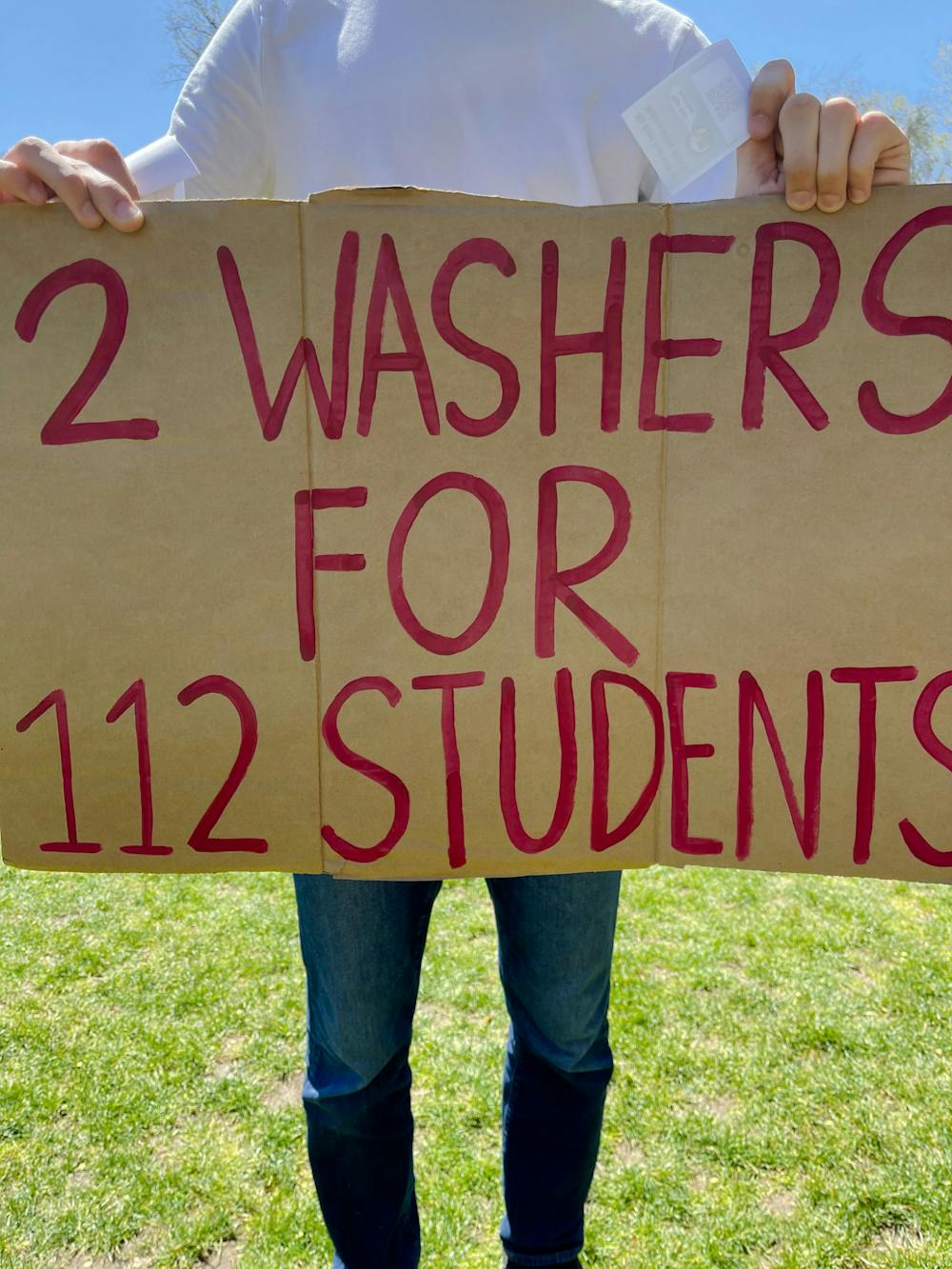Better Brown Now, a student advocacy group that focuses on issues that immediately impact the Brown campus and community, held a protest midday Friday on the Main Green to push for improvements to the housing process, better dormitory facilities and reforms to the Office of Residential Life. In addition to holding the protest, Better Brown Now has also published a petition and a list of demands addressing concrete changes the group hopes to see.
The group organized a larger protest calling for improved wages and working conditions for Brown Dining Services employees last fall, The Herald previously reported.
The group’s efforts come amid broader campus frustration with ResLife. In The Herald’s spring poll, more than 66% of respondents indicated that they “strongly disapprove” of how ResLife is handling its job. Many rising sophomores were unable to select housing during the normal housing lottery while ResLife employees have noted widespread facilities issues, The Herald previously reported.
The organization’s full list of demands addresses several areas in which it desires change, including “reinvestment into residence halls” and a “smoother housing lottery.” The list also outlines six demands for improved conditions for ResLife staff, including “respect and acceptance of identity,” “adequate, proportional compensation,” “more comprehensive training,” “expanded on-job supports.”
Their specific demands include free meal plan and housing for Community Coordinators — the newly created position to replace Residential Peer Leaders, ensuring that all ResLife positions are fully staffed and renovations to existing dorm facilities, among others.
The protest, according to organizer Jada Wooten ’24, aimed to elicit a response from University administration. She added that the group hopes for “a timeline outlining how (the University is) going to address the facility issues such as mold, lack of filtered water, lack of working laundry machines and the fact that we pay for the broken washing machines.”
The group also hopes the administration will address the understaffing of ResLife. “We really do want to emphasize that a lot of the issues with ResLife have to do with the staffing and lack of resources directed to it,” Wooten said.
In light of concerns surrounding gentrification, Wooten noted that renovations on existing facilities “would be good for the well-being of Brown students, but also (for) the Providence community.”
“Providence community members have increased concerns that Brown’s expansion is pushing residents out,” Wooten said. “If we were to reinvest in the dorms here, it would ensure that we push out” fewer local residents.
Better Brown Now began the campaign in early 2022, according to Wooten, when they were contacted by ResLife employees after having already spoken with some students about housing experiences during the COVID-19 pandemic.
The protest was held the same day as the University’s third A Day on College Hill event for admitted students, but Wooten emphasized that any perceived disrespect to the campus’ visitors was “not our intent at all.”
“We simply just want to inform them of the residential situation they're getting (into),” she added.
Angelina Rios-Galindo ’25, a protest attendee, hopes the University will also take greater efforts to improve accessibility. Holding a sign that read “My dorm is 100% wheelchair inaccessible,” Rios-Galindo criticized the lack of accessibility in the New Pembroke and Graduate Center dorms. “There (are) a lot of places on campus that exclude our differently abled students, and that's a really big issue,” she said.
Léo Corzo-Clark ’25, another protest attendee and also a New Pembroke resident, criticized his dorm’s facilities issues. “Our stairs were quite literally crumbling for most of the year and (were) very recently slightly repaved,” he said. For “the majority of the year, the building's been in shambles and when we talk to our RPLs about it, they really don't know what's going on — they don't know why things can't get fixed.”
Corzo-Clark added that he feels “really lucky” because he’ll be able to live in the Wellness Residential Experience at Sternlicht Commons next year. Still, he hopes to see the broader housing situation improve. “For everyone to be so cutthroat and stressed out about the housing lottery just shows that if all the dorms were livable and up to a certain standard, no one would be as (upset) or complain as much.”
Lauren Griffiths ’24, another protest organizer, claimed that racism and sexism experienced by ResLife staff is a major issue, saying, “there have been also several minority (Area Coordinators) who have quit recently … due to all the discrimination that they have faced.”
The group’s demands include that ResLife staffer identity and preferences be taken into consideration when assigned a dorm placement.
“Brown takes these issues very seriously,” wrote a University spokeswoman in an email to The Herald. “If we were to learn of any circumstance of discrimination, we would work directly with the affected individuals to provide support and to take available steps, depending on the nature of the situation.”
Ethan Drake ’24, a current RPL for Grad Center B, noted that staffing shortages can have wide-ranging impacts. “No one at ResLife is put in a position to be able to do a good job,” he said. “I think in the last month, two of the seven ACs have quit and left, leaving ResLife even more understaffed. RPLs, therefore, aren't put in a good position.” He added that his RPL cohort, initially made of eight RPLs, now consists of 22 RPLs due to an understaffing of ACs.
Understaffing causes tangible issues for RPLs themselves, according to Drake. “I'm an RPL in a building of over 100 people and I'm the only one, which just doesn't make any sense,” he said.
“When you multiply that with facilities issues like broken washers — we're down to two washers for an entire dorm for 100 residents — it makes it difficult to focus on other things that normally wouldn't be a problem.”
“There was never an RPL in my building until a month in and I applied … and got the role,” Drake said.
Wooten said she believes that increased benefits for workers could help to alleviate understaffing issues. “Part of what's in our demands and what we were working (on) … is making the positions more attractive” through increased compensation and free meal plan and housing for CCs, she said. “Honestly, that just means directing more resources to it.”
“For me personally, all of my work operates out of a place (of) love (for) Brown,” Wooten said. “But a part of loving a place is wanting better for it.”

Peter Swope was the senior editor of digital engagement for The Brown Daily Herald's 133rd Editorial Board. He previously served as a Sports section editor and has also written stories for University News. Peter is a senior from New Jersey studying history.





